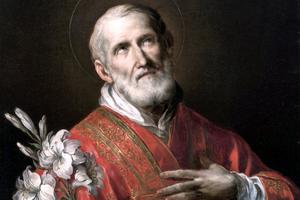St. Philip Neri Was a Humorist, But Not a Comedian
St. Philip Neri’s source of humor was a shrewd mortification that increased his humility and patience

When we think of saints and their images we typically imagine a solemn and quiet person of great holiness. Philip Neri was certainly a person of great holiness, but his holiness came from his great sense of joy. He was devoutly humorous, known to keep a nearby book of jokes, and his tactics for holiness and promoting holiness in those around him was peculiar and at many times, embarrassing. Despite this, his followers, and those of his Oratory, were known to be the happiest and most joyful of all the people in Rome at the time.
As a young boy he had more interest in the developing sciences of the day such as chemistry. But he wasn’t born with perfection in his soul — he knew how to get into some trouble here and there. There are two stories told by his biographer that are telling of his disposition before he realized he needed to shape up. When he was about 4, he thought it would be funny to play with an ox carrying a heavy load of fruit and vegetables. When the tenant wasn’t looking, little Neri climbed on top of the beast to fool around but he confused the beast and cause it to lose balance, throwing Neri to the ground, and the giant animal on top of him. His mother and father thought he was dead or gravely injured, but Neri came out from under the ox with no major injuries.
Next, a short time later, his sister has played a humorous trick on him, and he wanted to get her back. So one time, when she wasn’t looking, Neri shoved his sister from behind, causing her to fall violently to the ground. His parents were distraught with his behavior, and he was given a stern punishment and a thorough talking-to.
After these two events, little Neri noticed a trend — one he didn’t like and didn’t want to continue with — made a promise with himself, and to God, that he would never cause another to hurt: any fun he had would bring joy to others, not to their expense. The people who knew him from his birth to adolescence remarked unanimously that after this, he showed great respect for his parents, maintained a wonderful zeal for people, and never caused trouble again.
St. Philip Neri is commonly known as the saint who cracked jokes and was a source of amusement for others. This is all true, but when one reads his biographies, these stories are not the mainstays of his spiritual acumen. His disciple and biographer, Antonio Gallonio, only briefly mentions instances where Neri caused laughter, and it was not the routine many might expect. He was no comedian — he was a holy humorist, and his source of humor was a shrewd mortification that increased his humility and patience, and, by way of this also increased his holiness and influence on others.
Yes, Neri was known to show up to important events with half his beard shaved, give incorrect walking directions to his disciples, read a book of jokes, or pause for more than 10 minutes in the middle of the consecration at Mass. When he did each of these things he caused a mix of emotions in others, but it always ended up producing the same end state: increased humility, and increased patience.
In this Lenten season and, really, for the rest of our lives on earth, as we search for proven ways to increase in holiness, we must keep the wisdom of St. Neri close. Practical jokes can be productive. They don’t have to involve us getting hurt or causing others to hurt, but they might involve something that produces a sense of stress that can doubly become beneficial. Taking cold showers, driving the long way home, pausing for an extra moment in prayer, sharing a joke, and wearing/doing something completely unexpected, can each strike others as weird and embarrassing, but if executed the right way, will become humorous and fruitful.
Neri maintained his sense of humor to his final hours and a funny story is relayed to us. He battled severe illnesses frequently in his life, and it’s surprising that he lived to be 79 years old. In any case, when he was overtaken by his final illness, he knew his days were ending soon. Not because of his illness, but because he was told in a vision that he would die on the Feast of Corpus Christi. Still, he endured an unbearable amount of pain. Many gathered at his side to do anything possible to relieve him, but he rarely let them. On the night he passed, in order to check his mental acuity, one of his companions asked him what hour it was. Keep in mind, he knew from his vision that this was his last on earth. He responded, “It is 8pm. In an hour it will be 9. Then it will be 10 and 11 and then midnight. Now leave me so we can all sleep.” Everyone giggled. Their leader was truly fearless, and truly full of joy. May his intercessions cause the same to abide in us.
For more on these Saint Neri and others who will help you deepen your faith and practice daily conversion, check out my book Reform Yourself! How to Pray, Find Peace, and Grow in Faith with the Saints of the Counter-Reformation, available at Catholic Answers Press.
- Keywords:
- st. Philip neri














